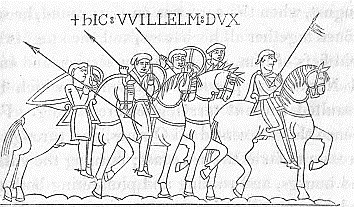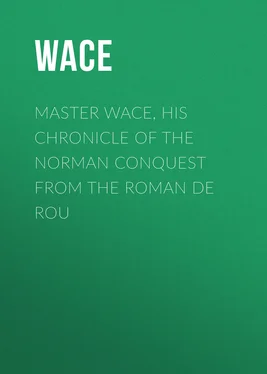Wace - Master Wace, His Chronicle of the Norman Conquest From the Roman De Rou
Здесь есть возможность читать онлайн «Wace - Master Wace, His Chronicle of the Norman Conquest From the Roman De Rou» — ознакомительный отрывок электронной книги совершенно бесплатно, а после прочтения отрывка купить полную версию. В некоторых случаях можно слушать аудио, скачать через торрент в формате fb2 и присутствует краткое содержание. Жанр: foreign_prose, История, foreign_edu, foreign_antique, на английском языке. Описание произведения, (предисловие) а так же отзывы посетителей доступны на портале библиотеки ЛибКат.
- Название:Master Wace, His Chronicle of the Norman Conquest From the Roman De Rou
- Автор:
- Жанр:
- Год:неизвестен
- ISBN:нет данных
- Рейтинг книги:4 / 5. Голосов: 1
-
Избранное:Добавить в избранное
- Отзывы:
-
Ваша оценка:
- 80
- 1
- 2
- 3
- 4
- 5
Master Wace, His Chronicle of the Norman Conquest From the Roman De Rou: краткое содержание, описание и аннотация
Предлагаем к чтению аннотацию, описание, краткое содержание или предисловие (зависит от того, что написал сам автор книги «Master Wace, His Chronicle of the Norman Conquest From the Roman De Rou»). Если вы не нашли необходимую информацию о книге — напишите в комментариях, мы постараемся отыскать её.
Master Wace, His Chronicle of the Norman Conquest From the Roman De Rou — читать онлайн ознакомительный отрывок
Ниже представлен текст книги, разбитый по страницам. Система сохранения места последней прочитанной страницы, позволяет с удобством читать онлайн бесплатно книгу «Master Wace, His Chronicle of the Norman Conquest From the Roman De Rou», без необходимости каждый раз заново искать на чём Вы остановились. Поставьте закладку, и сможете в любой момент перейти на страницу, на которой закончили чтение.
Интервал:
Закладка:
The French were greatly moved and troubled at the news, and went crying out that they tarried too long. They seized the palfreys and war-horses, harnessed and loaded the baggage horses, set fire to the tents and huts, emptied them of every thing, and sent all on forward; and the king went off on his way homeward, looking cautiously around him. Had the duke wished to pursue, he might have injured him much, but he did not desire to annoy him more. "He has had quite enough," said he, "to trouble and cross him;" and he would not add more to his annoyance.
The king returned to Paris, the barons to their homes, and the great people whom he had led forth returned to their own countries. But his wrath against the Normans was very great, on account of those whom they had taken prisoners, and still more for those who were killed. The dead he could not recover, but he wished to redeem those who were prisoners; so he sent word to the duke, that if he would release his prisoners, he would make truce and peace with him till other cause of difference should arise; and that whatever the duke had taken or might take from Giffrei Martel, should never be a cause of war between them, or be alleged as a grievance against him.
And thereupon accordingly was done as I tell you; the duke restored the Frenchmen who were prisoners, but the harness was left to those who had won it; and the prisoners repaid to their captors the charges they had occasioned to them.

CHAPTER VI.
HOW THE KING OF FRANCE CAME AGAIN AGAINST DUKE WILLIAM, AND WAS DEFEATED AT VARAVILLE
Duke William carried himself gallantly, and triumphed over all his enemies; he was loved for his liberality, and feared for his bravery. He conquered many and won over many, lavishing his gifts around, and spending much; till the French became very jealous of his chivalry; of the troops that he had, and of the lands he conquered. Their king moreover could never be reconciled to the Normans; but said that he would sooner perjure himself, than not have his revenge for the battle of Mortemer. Then under the advice of Giffrei Martel 90 90 We have seen that after the battle of Mortemer, the king of France abandoned Jeffery Martel 'un quens d'Angou,' a deadly enemy to the duke. Wace narrates the feuds between them; and among the rest William's terrible revenge on those who, in defending Alençon, had annoyed him by allusions to his birth, crying out, 'La pel, la pel al parmentier!' These passages of the chronicle we pass over as not material to our present purpose.
, before August, when the corn was on the ground, he summoned together all his barons, and the knights who held fiefs of him, and owed him service, and entered Normandy, passing by Oismes 91 91 Hyèmes or Exèmes, now in the arrondissement of Argentan.
, which they assaulted without tarrying before it long. From thence they traversed all Oismes, and through the Beessin as far as the sea coast; burning the villages and bourgs, and ruining and plundering both men and women, till at length they came to St. Pierre-sor-Dive. The town was completely garrisoned by them, and the king lay at the abbey 92 92 The abbey of St. Pierre-sur-Dives was founded before 1040, by Lesceline, wife of William, count d'Eu.
.
The duke was with his people at Faleise, when the news came, concerning the wrong the king was doing him; and it grieved him sorely. So he sent out and assembled his knights, and strengthened his castles, cleansing the fosses, and repairing the walls; being determined to let the open country be laid waste, if he could maintain his strong places. He could easily, he said, recover the open lands, and repair the injury done to them. So he did not shew himself at all to the French, but let them wander over the country, intending to give them scurvy usage on their return back from their expedition.
The king meantime went on with his project. He would go, he said, towards Bayeux, and ravage the whole of the Beessin, and on his return thence would pass by Varavile 93 93 In the arrondissement of Caen, near the Dives.
, and lay waste Auge and Lievin. Accordingly the French overran the Beessin, as far as the river Seule 94 94 A small river passing near Bayeux to the sea at Bernières.
; and returned from thence to Caen, where they passed the Ogne 95 95 The Orne.
. Caen was then without a castle, and had neither wall nor fence to protect it 96 96 Huet cites this passage in his Origines de Caen . Quesnel (translated above fence ) seems properly a wooden barricade, being derived from quesne, or chêne.
. When the king left Caen, he proceeded homeward by Varavile, as he had proposed.
His train was great and long, so that it could not all be kept together; and the press was great to pass the bridge, every one wanting to be the foremost.
The duke, knowing some how or another all that was going on, and by what route the king would pass, hastened upon his track with the great body of troops that he led, and conducted his people in close order along the valley below Bavent 97 97 A little south of Varaville, along the Dives.
. All over the country he sent out word, and summoned the villains to come to his aid as quickly as they could, with whatever arms they could get. Then from all round the villains were to be seen flocking in, with pikes and clubs in their hands.
The king had passed the river Dive, which runs through that country, together with all those of his host who had taken care to move quickly forward. But the baggage train was altogether, and far behind, extending over a great length. The duke, seeing that all who were thus in the rear were certain to fall into his hands, pressed on his men from village to village; and when he reached Varavile, he found those of the French there who remained to form the rear guard. Then began a fierce melée, and many a stroke of lance and sword. The knights struck with their lances, the archers shot from their bows, and the villains attacked with their pikes; charging and driving them along the chaussée, overwhelming and bearing down numbers. The Normans kept continually increasing in numbers, till they became a great force, and the French pressed forwards, one pushing the other on. The chaussée incommoded them very much, being long and in bad repair, and they were encumbered by their plunder. Many were to be seen breaking the line, and getting out of the track, who could not retrace their steps, nor reach the main road again.
The great press was at the bridge, every one being eager to reach it. But the bridge was old, the boards bent under the throng, the water rose, and the stream was strong; the weight was heavy, the bridge shook and at length fell, and all who were upon it perished. Many fell in close by the bridge foot where the water was deep; all about harness was to be seen floating, and men plunging and sinking; and none had any chance of life save skilful swimmers.
The cry arose that the bridge was broken. Grievous and fearful was that cry, and no one was so brave or bold as not to tremble for his life when he heard what had happened, and to see that his hour of exultation was gone by. They see the Normans meanwhile pressing on from behind, but there was no escape; they go along the banks of the river, seeking for fords and crossings, throwing away their arms and plunder, and cursing their having brought so much. They go straggling and stumbling over the ditches, helping each other forward, the Normans pursuing and sparing no one, till all those who had not crossed the bridge were either taken prisoners, killed, or drowned. Never, they say, were so many prisoners taken, or such great slaughter made in all Normandy. And William glorified God for his success.
Читать дальшеИнтервал:
Закладка:
Похожие книги на «Master Wace, His Chronicle of the Norman Conquest From the Roman De Rou»
Представляем Вашему вниманию похожие книги на «Master Wace, His Chronicle of the Norman Conquest From the Roman De Rou» списком для выбора. Мы отобрали схожую по названию и смыслу литературу в надежде предоставить читателям больше вариантов отыскать новые, интересные, ещё непрочитанные произведения.
Обсуждение, отзывы о книге «Master Wace, His Chronicle of the Norman Conquest From the Roman De Rou» и просто собственные мнения читателей. Оставьте ваши комментарии, напишите, что Вы думаете о произведении, его смысле или главных героях. Укажите что конкретно понравилось, а что нет, и почему Вы так считаете.












